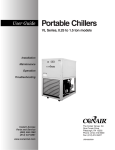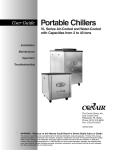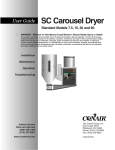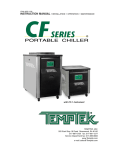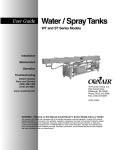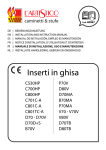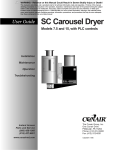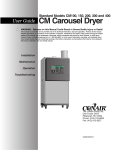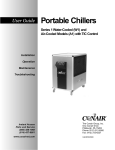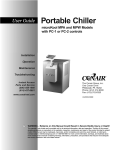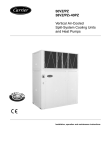Download Conair 0.25 to 1.5 ton Technical information
Transcript
VL Series, 0.25 to 1.5 ton models Portable Chillers Installation Maintenance Operation Troubleshooting The Conair Group, Inc. One Conair Drive Pittsburgh, PA 15202 Phone: (412) 312-6000 Fax: (412)-312-6227 UGH020/0301 WARNING - Reliance on this Manual Could Result in Severe Bodily Injury or Death! This manual is out-of-date and is provided only for its technical information, data and capacities. Portions of this manual detailing procedures or precautions in the operation, inspection, maintenance and repair of the product forming the subject matter of this manual may be inadequate, inaccurate, and/or incomplete and cannot be used, followed, or relied upon. Contact Conair at [email protected] or 1-800-654-6661 for more current information, warnings, and materials about more recent product manuals containing warnings, information, precautions, and procedures that may be more adequate than those contained in this out-of-date manual. Please record your equipment’s model and serial number(s) and the date you received it in the spaces provided. It’s a good idea to record the model and serial number(s) of your equipment and the date you received it in the User Guide. Our service department uses this information, along with the manual number, to provide help for the specific equipment you installed. Please keep this User Guide and all manuals, engineering prints and parts lists together for documentation of your equipment. Date: Manual Number: UGH020/0301 Serial number(s): Model number(s): DISCLAIMER: The Conair Group, Inc., shall not be liable for errors contained in this User Guide or for incidental, consequential damages in connection with the furnishing, performance or use of this information. Conair makes no warranty of any kind with regard to this information, including, but not limited to the implied warranties of merchantability and fitness for a particular purpose. Copyright 2001 THE CONAIR GROUP, INC. All rights reserved TABLE OF CONTENTS 1.0 GENERAL 1.1 Unit location 1.2 Efficiency 1.3 Safety 1.4 Clean air act 1.5 Miscellaneous 5 6 6 6 6 7 2.0 INSTALLATION 2.1 General 2.2 To and From process connections 2.3 Unit drain 2.4 Air-cooled condenser 2.5 Electrical connection 9 10 10 11 11 12 3.0 OPERATIONS SEQUENCE 3.1 General 3.2 Start up / operations procedure 3.3 Instrument operation 3.4 Shut down / disconnect sequence 13 14 14 15 18 4.0 TROUBLESHOOTING 4.1 Unit will not start 4.2 Pump will not start 4.3 Compressor will not start 4.4 Unit shuts down on high pressure switch 4.5 Unit shuts down on low pressure switch 19 20 20 20 20 20 5.0 MAINTENANCE 5.1 Warranty service procedure 5.2 Periodic preventative maintenance 5.3 Special maintenance 5.4 Pump repair 23 24 24 25 25 6.0 COMPONENTS 6.1 Water system 6.2 Refrigeration system 27 28 28 7.0 RELATED DRAWINGS 7.1 Electrical (typical) 7.2 Circuit schematic 29 30 31 8.0 APPENDIX 8.1 Specifications 8.2 Operations below 48°F 8.3 Water quality control 8.4 Inhibited propylene glycol 8.5 Chiller capacity and derate chart 8.6 Pressure - temperature chart for R-22 8.7 Engineering formulas 8.8 Spare parts list 33 34 35 37 37 39 40 41 42 UGH020/0301 VL Series Portable Chillers, 0.25 to 1.5 Tons Page: 3 THIS PAGE INTENTIONALLY BLANK Page: 4 VL Series Portable Chillers, 0.25 to 1.5 Tons UGH020/0301 1.0 GENERAL 1.1 1.2 1.3 1.4 1.5 UGH020/0301 UNIT LOCATION EFFICIENCY SAFETY CLEAN AIR ACT MISCELLANEOUS VL Series Portable Chillers, 0.25 to 1.5 Tons Page: 5 1.1 1.2 UNIT LOCATION A. The unit is designed for indoor use only. For most efficient operation, locate the chiller in a clean, dry and well ventilated environment. B. The unit has an air-cooled refrigerant condenser. For air-cooled condensers, a motor driven fan generates air flow through the condenser to remove heat from the refrigerant system. The aircooled condenser on the unit will discharge a maximum of 15,000 BTUs per hour per ton of cooling. C. The unit must have a minimum entering air temperature of 60°F and a maximum entering air temperature of 95°F for efficient operation. D. The unit must have a minimum of two feet clearance at the air intake and six feet at the exhaust air discharge. E. If the operator has any questions concerning the location and operation of the unit, contact the Conair service department at 800-458-1960. EFFICIENCY A. 1.3 1.4 SAFETY A. It is important to become thoroughly familiar with this manual and the operating characteristics of the unit. B. It is the owner’s responsibility to assure proper operator training, installation, operation, and maintenance of the unit. C. Observe all warning and safety placards applied to the unit. Failure to observe all warnings can result in serious injury or death to the operator and sever mechanical damage to the unit. CLEAN AIR ACT A. Page: 6 Long term efficiency of operation is largely determined by proper maintenance of the mechanical parts of the unit and the water quality. Conair recommends filtering where required to prevent solids from plugging critical parts (pumps, heaters, seals for example). Conair highly recommends the services of a competent water treatment specialist be obtained and his recommendations followed. Conair accepts no responsibility for inefficient operation, or damage caused by foreign materials or failure to use adequate water treatment. The unit contains HCFC-22 (chlorodifloromethane). This is a class 2 substance. VL Series Portable Chillers, 0.25 to 1.5 Tons UGH020/0301 1.5 B. Please be aware that effective July 1, 1992, it is unlawful for any person in the course of maintaining, servicing, repairing, or disposing of refrigeration equipment to knowingly vent or otherwise dispose of any class 2 substance used as a refrigerant in the manner which permits such substance to enter the environment. C. De minimis releases associated with good faith attempts to recapture, reclaim, or recycle such substance shall not be subject to the prohibition set forth in the preceding paragraph. MISCELLANEOUS A. The purpose of the unit is to circulate temperature stabilized fluid through your process, resulting in process temperature control. B. The ability of the unit to maintain process temperature control is significantly affected by the method of installation. C. If the operator has any questions concerning the location and operation of the unit, please contact the Conair service at 800-458-1960 or 814-437-6861 Electrical Panel Reservoir Illuminated ‘On’ Switch Controller Bypass Valve Thermocouple Refrigerant Sight Glass Pump Filter-Drier Air Cooled Condenser Refrigerant Safety Switches Condensing Fan Power Cord Liquid Receiver Caster UGH020/0301 VL Series Portable Chillers, 0.25 to 1.5 Tons Page: 7 THIS PAGE INTENTIONALLY BLANK Page: 8 VL Series Portable Chillers, 0.25 to 1.5 Tons UGH020/0301 2.0 INSTALLATION 2.1 2.2 2.3 2.4 2.5 UGH020/0301 GENERAL TO AND FROM PROCESS CONNECTIONS UNIT DRAIN AIR COOLED CONDENSER ELECTRICAL CONNECTION VL Series Portable Chillers, 0.25 to 1.5 Tons Page: 9 2.1 GENERAL A. All process piping materials (such as hose, rigid piping, valves or filters) used in process water piping circuitry must be rated for 100°F minimum temperature and 100 PSI minimum pressure. B. All such materials must have the equivalent or larger diameter of the particular process connection that length of process water piping is connected to. From process connection: connect to “water out” on process manifold To process connection: connect to “water in” on process manifold 2.2 Page: 10 TO AND FROM PROCESS CONNECTIONS A. Connect the chiller’s “to process” connection to the “water in” manifold on the mold or process. B. Connect the chiller’s “from process” connection the “water out” manifold at the mold or process. C. Process water piping circuitry should be designed to avoid an excessive use of elbows and/or lengths of pipe or hose. If hose is the material of choice, avoid tight twists or curls and excessive lengths. D. Valves and filters may be installed in the process water piping circuitry to facilitate service and maintenance provided that such devices maintain the full inside diameter of the process connection. If installed, all such devices must be open and clean during unit operation. VL Series Portable Chillers, 0.25 to 1.5 Tons UGH020/0301 2.3 DRAIN CONNECTION: A. The unit is supplied as standard with a ProCon type pump. In some cases, it may be necessary to drain the unit. This is done by removing the pump volute plug in the pump assembly. B. Note that if chemical treatment of process fluid or additives are use, drainage shall be done according to local codes. C. It is important to note that drainage procedures must be done prior to shipment or outdoor storage or the unit. If not, freezing damage can occur. Motor Thermocouple Pump Drain plug 2.4 UGH020/0301 AIR COOLED CONDENSER A. Air-cooled condenser require ambient air temperatures between 60°F and 95°F for efficient operation. Operating above 95°F may result in elevated condensing pressures and eventual shut-down on the high pressure safety switch. Check with the Conair service department for more information on operating with ambient air temperatures above 95°F or below 60°F. B. Air flow is generated by the motor driven fan. Air flow is from the outside of the chiller, through the condenser and exhausted through the unit. Exhaust air can not be ducted on motor driven fan models. C. A free air space of at least four (4) feet is required at the condenser intake and four (4) feet at the condenser discharge to allow for proper air flow. D. At full load, this chiller will discharge approximately 15,000 BTU/hr per hour per ton of cooling. VL Series Portable Chillers, 0.25 to 1.5 Tons Page: 11 2.5 ELECTRICAL CONNECTION A. C. NEMA 1 MODELS 1. Electrical power supply requirements for Nema 1 units (figure 2.5A) are identified on the equipment data plate. Verify that available voltage supply is the same as the unit’s voltage requirements. WARNING: Do not connect the unit to a voltage supply source not equal to the unit’s voltage requirements as specified on the unit’s data plate. Use of incorrect voltage will void the unit’s warranty and cause a significant hazard that may result in serious personal injury and unit damage. 2. A factory supplied, four conductor cable is installed for connection to a customer supplied fused power disconnect device. The fused disconnect device shall be sized and installed according to the unit’s power supply requirements and local electrical codes. CONTROL CIRCUIT WIRING 1. D. The unit’s supplied control circuit is indicated in the electrical diagrams. The control circuit is supplied by the factory installed transformer. GENERAL 1. Make certain all ground connections to the unit are properly affixed. 2. Make certain power conductor, disconnect device, and fusing are properly sized according to the unit’s power supply requirements. 3. Make certain all electrical connections are tightly affixed. Any loose wiring connections must be tighten before engaging the power supply. 4. Make certain no moisture or standing water is present inside the electrical cabinet. Microprocessor controller Page: 12 Transformer Illuminated on/off switch VL Series Portable Chillers, 0.25 to 1.5 Tons Motor starter UGH020/0301 3.0 OPERATIONS 3.1 3.2 3.3 3.4 UGH020/0301 GENERAL START UP/OPERATIONS PROCEDURE INSTRUMENT OPERATION SHUT DOWN/DISCONNECT SEQUENCE VL Series Portable Chillers, 0.25 to 1.5 Tons Page: 13 3.1 3.2 GENERAL A. Failure to follow the factory required operation procedures may adversely affect the unit’s ability to control process temperature and may create a hazardous operating condition which may result in unit damage and serious operator injury or death. B. The Operations segment of this manual is outlined below: Machine start-up/operations procedure - follow this segment to start the unit after the initial installation or to restart the unit after reinstallation to the same or different process. This section includes information on system fill, electric motor phasing (pump rotation) and process flow adjustments. 3.3 Instrument - follow this segment to start up and operate the instrument controller. This section includes information on automatic and manual venting, setpoint selection and adjustment, and feature explanations. 3.4 Shut down procedure - follow this segment to shut down the unit. This segment includes information on system cool down, shut down, electrical power supply precautions, and disconnection from system. START UP/OPERATIONS PROCEDURE A. Page: 14 3.2 SYSTEM FILL 1. The unit has an internal reservoir which must be filled and maintained for proper operation. 2. Conair recommends the addition of 20% inhibited propylene glycol to the process fluid. This should help prevent the process fluid from freezing and internal components from rusting. A biocide must be added to the water to prevent organism growth in the chilled water system. See water treatment section in section 8 of this manual for more information. 3. Remove the top panel to access the reservoir. Add fluid directly to the reservoir tank. Please note, when the pump is first started, and after the process lines are filled and entrained air is purged, additional fluid may be required to restore the reservoir to the correct level. Reservoir VL Series Portable Chillers, 0.25 to 1.5 Tons UGH020/0301 B. 3.3 OPERATIONS 1. Turn the thermostat to the highest setting. 2. Shift the illuminated toggle switch to the ‘ON’ position. The pump will begin operations. Note the reservoir level, if it drops below 3/4 full, add fluid. 3. Check the unit and process system for leaks. Repair any that are discovered. 4. Adjust the setpoint thermostat as required for the process. 5. Note, the compressor will start if the fluid temperature is above the selected setpoint temperature. When the compressor starts, listen for any knocking or other unusual noise. Report any unusual noise to the Service department and discontinue operations. 6. Do not operate the unit without all sheet metal enclosure panels secured. 7. Process flow is adjusted according to the pump motor amperage. This rating can be found on the pump motor data plate. With all process valves fully open and with the pump motor operating, check amp draw with an amp meter and note findings. b. Compare amp draw with pump motor rating. If excessive, partially close the from process valve to adjust motor amps. INSTRUMENT OPERATION A. B. GENERAL DESCRIPTION A. The EWPC 902/T/R/P controller is a new series of microprocessor-based and fully programmable process controllers for single point applications. B. The front keypad of this controller offers several alphanumeric menu prompts to configure the controller for each specific application). FRONT KEYPAD 1. UGH020/0301 a. SET: push to display the setpoint value. The setpoint can be changed by using the “up” or “down” button. The control will automatically switch back to normal operating mode within 3 seconds. The last entered setpoint will stay in memory. VL Series Portable Chillers, 0.25 to 1.5 Tons Page: 15 Output Status Light Up Arrow Down Arrow UP out DOWN SET ewpc902t C. Page: 16 Set Button Press for less than 3 seconds to change setpoint. Press for more than 4 seconds to access parameters. 2. UP: used to increase the setpoint value, as well as the parameter when in programming. When held down for a few seconds, the change rate accelerates. 3. DOWN: used to decrease the setpoint value, as well as the parameter when in programming. When held down for a few seconds, the change rate accelerates. 4. OUT: status light of the output, blinks when in setpoint display/change mode or during programming. DESCRIPTION OF PARAMETERS 1. D1: setpoint differential. The switching differential (hysteresis) can be set with positive value (make on rise) or with negative value (make on fall). See parameter “HC1”. 2. LS1: lower set. This is the lower limit below which the user cannot change the setpoint; normally set at the lowest value recommended for the sensor. 3 HS1: higher set. Similar to “LS1”, however setting an upper limit for the setpoint. 4. od: output delay. This provides a delay selection for the outputs in applications where noise may cause brief erroneous signals from the sensor to the controller. Factory set at “0”. 5. Lci: lower current input (for EWPC 902/R, EWPC 902/P and EWPC 902/T with current input only). Read-out corresponding to 4 mA input signal (factory set at 20 %R.H for EWPC 902/R). 6. Hci: high current input (for EWPC 902/R, EWPC 902/P and EWPC 902/T with current input only). Read-out corresponding to 20 mA input signal (factory set at 100 %R.H for EWPC 902/R). 7. CAL: CALibration. This offers an adjustment up or down of the read-out, if needed. Factory set at “0”. VL Series Portable Chillers, 0.25 to 1.5 Tons UGH020/0301 D. UGH020/0301 8. PSE: Probe SElection. Input type (for RTD or Thermocouples only). RTD models: Ni = Ni100; Pt = Pt100. T/C models: FE = TcJ; Cr = TcK; rh = TcS. 9. HC1: Heating/Cooling. Relay switch function. H = heating (humidification; reverse action); C = cooling (dehumidification; direct action). 10. rP1: relay Protection 1. Determines the status of the relay in case of sensor defect. Factory set at “ro”. ro = relay open; rc = relay closed. 11. LF1: Led Function 1. Determines whether the status light in ON or OFF in relation to output 1. di = direct = light ON when output 1 is energized; in = reverse = light OFF when output 1 is energized. 12. dP: decimal Point. Choose whether the resolution is required with or without decimal point. oF = without decimal point; on = with decimal point. 13. Notes: (a) the decimal point of models with current or voltage input is shifted: the actual value of parameters “Lci” and “Hci” must be multiplied by 10. (b) On all versions, if a unit is changed from without decimal point to with decimal point, all parameter values expressed in degrees will automatically be divided by 10, including the setpoint! (c) The decimal point selection is not available on models for thermocouple input. 14. hdd: half digit display. The right-most digit can be set to read-out in 0 or 5 only, or in all 10 digits. hdd = n : e.g. 070, 071, 072 etc (if without decimal point) or 70.0, 70.1, 70.2 etc (if with decimal point.); hdd = y : e.g. 070, 075, 080, etc. (if without decimal point) or 70.0, 70.5, 80.0 etc, (if with decimal point). Useful when measuring values varying rapidly (e.g. %R.H.) 15. tAb: tAble of parameters. This shows the configuration of the parameters as set in the factory; can not be modified (for factory identification and diagnostic purposes only). PARAMETERS DEFAULTS 1. Programming is easily accessed by holding the “SET” button down for more than 4 seconds. 2. The first parameter is displayed while the status light Led “out” remains blinking during the programming period. VL Series Portable Chillers, 0.25 to 1.5 Tons Page: 17 DEFAULT SETTING - STANDARD MODLES E. 3.4 DECRIPTION RANGE UNIT d1 differential min / max C/ F 4 LS1 Lower Set min / max C/ F 40 HS1 Higher Set min / max C/ F 70 od output delay min / max seconds 60 Lci Low current input min / max various 0 Hci High current input min / max various 0 CAL CALibration min / max C/ F 0 PSE Probe SElection Ni / Pt / Fe / Cr / rh / Fe HC1 Heating / Cooling H/C flag C rP1 relay Protection ro / rc flag RO LF1 Led Function di / in flag OF dp decimal Point on / oF flag N hdd half digit display n/y flag tAb tAble of parameter / flag 3. Other parameters are accessed with the “UP” and “DOWN” button. With the “SET” button, the actual setting of each parameter is displayed. To change a parameter setting, push the “SET” plus the “UP” (or “DOWN”). 4. The system will automatically return to its normal operating mode a few seconds after the programming procedure is completed or interrupted. ERROR ANNUNCIATION 1. Any sensor input defect will be displayed as follows: “ - - - ” in case of shorted sensor - “ EEE ”; in case of sensor break or sensor absence. The “ EEE ” error message also appears in the event of overrange of underrange of the system temperature. 2. It is recommended to double check the sensor wiring before diagnosing a probe as defective. SHUT DOWN/DISCONNECT SEQUENCE A. PRECAUTIONS/WARNINGS 1. B. The operator must precisely follow all shut down procedures outlined in this manual. If the operator fails to do so, an unsafe condition can develop resulting in damage to the unit or injury and/or death to operating personnel. UNIT SHUT DOWN (without system disconnect) 1. Page: 18 FACTORY PARAMETER To shut down the unit: toggle ‘off’ the rocker switch and disconnect the electrical supply. VL Series Portable Chillers, 0.25 to 1.5 Tons UGH020/0301 4.0 TROUBLESHOOTING 4.1 4.2 4.3 4.4 4.5 UGH020/0301 UNIT WILL NOT START PUMP WILL NOT START COMPRESSOR WILL NOT START UNIT SHUTS DOWN ON HIGH PRESSURE SWITCH UNITS SHUTS DOWN ON LOW PRESSURE SWITCH VL Series Portable Chillers, 0.25 to 1.5 Tons Page: 19 4.1 4.2 4.3 4.4 4.5 Page: 20 UNIT WILL NOT START A. Blow fuse at power supply - isolate open fuse and replace. Double check fuse sizes against nameplate amperage. B. Low voltage - measure incoming voltage with meter, voltage must be within 10% of nameplate voltage or warranty will be voided. PUMP WILL NOT START A. Impeller bound or frozen shaft bearing in motor. B. Open motor winding. C. Internal overload tripped. D. Loose wire connection or defective start capacitor. E. On/off circuit breaker tripped. COMPRESSOR WILL NOT START A. Safety switch open - unsafe condition exists (consult safety switch section in this manual). B. Windings overheated - over temperature switch on compressor tripped. C. Circuit breaker tripped - reset and check amperage. Verify voltage is correct, check for loose wire connection at motor. Defective circuit breaker. D. Bad or defective start capacitor. UNIT SHUTS DOWN ON HIGH PRESSURE SWITCH A. Low air flow across condenser. Check for dirty condenser fins. B. Fan not operating. Check for loose fan blade or open/grounded motor winding. C. High ambient air temperature (above 95°F). D. Insufficient clear space around unit. UNIT SHUTS DOWN ON LOW PRESSURE SWITCH A. Attempting to operate below 40°F. B. Low refrigerant charge. VL Series Portable Chillers, 0.25 to 1.5 Tons UGH020/0301 UGH020/0301 C. Restriction to refrigerant flow in refrigeration circuit. D. Poor heat transfer in evaporator tank because (1) percentage of glycol to water is too high and (2) scaled tubes in evaporator tank (chemically descale). E. Low flow through evaporator tank due to (1) process flow restricted or (2) glycol foaming. VL Series Portable Chillers, 0.25 to 1.5 Tons Page: 21 THIS PAGE INTENTIONALLY BLANK Page: 22 VL Series Portable Chillers, 0.25 to 1.5 Tons UGH020/0301 5.0 MAINTENANCE 5.1 5.2 5.3 5.4 UGH020/0301 WARRANTY SERVICE PROCEDURE PERIODIC PREVENTATIVE MAINTENANCE SPECIAL MAINTENANCE PUMP REPAIR VL Series Portable Chillers, 0.25 to 1.5 Tons Page: 23 5.1 5.2 WARRANTY SERVICE PROCEDURE A. In the event of a problem with a chiller that can not be resolved by normal troubleshooting procedures, the customer is invited to consult the Conair service department for assistance. The correct model number and serial number of the chiller must be available. The service department will attempt to isolate the problem and advise repair procedures. Often times, with the customer’s input and with the machine diagnostics, problems can be determined with “over-the-phone” consultation. B. If the problem is beyond the scope of “over-the-phone” consultation, and if the warranty status of the machine is valid, Conair will contact the nearest authorized service contractor and provide authorization to conduct an “on-site” inspection of the unit in order to determine the course of repair. If the chiller is not covered by the warranty, Conair will advise on the repair and recommend available service contractors. C. Conair manufactures a complete line of heat transfer equipment. It is of the utmost importance that Conair have the correct model number and serial number of the machine in question. This will allow Conair to obtain the correct manufacturing records which will help the service department to properly troubleshoot the problem and obtain the proper replacement parts when they are required. This information is stamped on the metal data tag that is attached to the machine. D. The Conair service department must be notified prior to any repair or service of a warranty nature. Warranty claims will not be honored without prior authorization. PERIODIC PREVENTATIVE MAINTENANCE Page: 24 A. Lubricate all motors. Note that some motors are supplied with sealed bearings. B. Tighten all wire terminals. C. Clean and check motor starter and contactor contacts. D. Check safety switch settings. E. Clean condenser fins of dust and dirt. F. Back flush evaporator. G. Check glycol/water solution ratio for operating temperature. H. Check system for leaks. VL Series Portable Chillers, 0.25 to 1.5 Tons UGH020/0301 5.3 I. Refrigerant sight glass: check for bubbles when compressor is operating at 100%. Check the moisture indicator for a color other than green. J. Clean unit. SPECIAL MAINTENANCE A. 5.4 Any service of the refrigeration system must be accomplished by a certified refrigeration technician. 1. Vacuum check compressor. 2. Addition of compressor oil. 3. Addition of refrigerant. 4. Repair of a refrigerant leak. 5. Adjustment of super heat. 6. Changing of filter-drier or drier core. 7. Repair of a refrigeration solenoid. 8. Valve plate replacement on compressor. PUMP REPAIR A. The positive displacement pump in the unit is not field serviceable. To arrange for repair contact: PROCON PUMPS 910 RIDGELY ROAD MURFEESBORO, TN 37310 615-890-5710 UGH020/0301 VL Series Portable Chillers, 0.25 to 1.5 Tons Page: 25 THIS PAGE INTENTIONALLY BLANK Page: 26 VL Series Portable Chillers, 0.25 to 1.5 Tons UGH020/0301 6.0 COMPONENTS 6.1 6.2 UGH020/0301 WATER SYSTEM REFRIGERATION SYSTEM VL Series Portable Chillers, 0.25 to 1.5 Tons Page: 27 6.1 WATER SYSTEM A. 6.2 Page: 28 MOTOR/PUMP ASSEMBLY: the motor/pump assembly circulates chilled fluid to the process loop. The pump assembly is built of brass to maintain water quality. REFRIGERATION SYSTEM A. COMPRESSOR: hermetic compressors take low pressure/low temperature refrigerant gas and compress the gas into high pressure/high temperature gas). B. AIR COOLED CONDENSER: the air cooled condenser removes BTUs from the compressor refrigerant gas. The action causes the gas to “condense” into a liquid state still under high pressure. Air flow across the condenser is achieved via a motor driven fan. C. FILTER-DRIER: the filter-drier removes contaminants and moisture from the liquid refrigerant. D. LIQUID RECEIVER: serves as a collection tank for high pressure liquid refrigerant to ensure total charge at all times. E. REFRIGERANT SIGHT GLASS: the refrigerant sight glass indicates refrigerant charge and moisture content. Refrigerant charge is determined by a clear liquid flow. Bubbles indicate low refrigerant. Moisture content is indicated by the color of the element. Element color is normally green. If the color of the element is chartreuse or yellow, the system has been contaminated with moisture. In such case, the filter-drier must be replaced. The replacement of the filter-drier must be completed by a qualified refrigerant service technician. F. EXPANSION VALVE: the expansion valve throttles flow of refrigerant liquid into the evaporator and creates a pressure drop in the refrigerant system that allows the liquid refrigerant to “boil off” inside the evaporator. G. EVAPORATOR: the evaporator is a tube in tube heat exchanger where the refrigerant liquid is allowed to evaporate (boil off) to absorb heat (BTU) from the process fluid. As the heat is absorbed, the process fluid is chilled. H. HIGH/LOW PRESSURESTATS: the high/low pressurestats protect the refrigeration system from unsafe operating levels. The high pressure switch is factory set to open at 325 psi and protects the refrigeration components and personnel from potential damage of injury from excessive high pressure. The high pressure safety must not be altered in the field for any reason. The low pressure switch is factory set to open at 58 psi and to close at 63 psi. The low pressure switch protects the chillers from possible damage due to low operating pressure. The low pressure switch is field adjustable for setpoints below 48°F. VL Series Portable Chillers, 0.25 to 1.5 Tons UGH020/0301 7.0 RELATED DRAWINGS 7.1 7.2 UGH020/0301 ELECTRICAL DRAWING (TYPICAL) CIRCUIT SCHEMATIC VL Series Portable Chillers, 0.25 to 1.5 Tons Page: 29 7.1 ELECTRICAL DRAWING (TYPICAL) UNIT ON/OFF 5 1 5 2 6 6 GREEN BLU/YEL BLU 7 5 6 230/1/60 PRIMARY RELAY 24 VAC SECONDARY BLU 8 11 8 M1 GREEN BLK/ BLK/YEL BLK/RED BLK/WHT GREEN POWER ENTRY 230/1/60 5 1 6 0 4 2 2 4 4 1 9 10 7 6 8 9 7 10 8 9 TYPE "J" THERMOCOUPLE 3 11 11 5 Page: 30 3 DUAL HIGH-LOW PRESSURESTAT 4 10 ELIWELL 902T 1 3 C 5 13 GREEN 2 PUMP R CONDENSING UNIT 13 11 5 11 5 VL Series Portable Chillers, 0.25 to 1.5 Tons UGH020/0301 7.2 CIRCUIT SCHEMATIC 2 11 10 12 1 3 7 4 5 ITEM 1 2 3 4 5 6 7 8 9 10 11 12 UGH020/0301 6 9 8 DESCRIPTION Compressor Air cooled condenser Liquid receiver Filter-drier Refrigerant sight glass Expansion valve Evaporator Pump To process connection From process connection Reservoir tank Refrigerant safety switch VL Series Portable Chillers, 0.25 to 1.5 Tons Page: 31 THIS PAGE INTENTIONALLY BLANK Page: 32 VL Series Portable Chillers, 0.25 to 1.5 Tons UGH020/0301 8.0 APPENDIX 8.1 8.2 8.3 8.4 8.5 8.6 8.7 8.8 UGH020/0301 SPECIFICATIONS OPERATION BELOW 45°F WATER QUALITY CONTROL INHIBITED PROPYLENE GLYCOL CHILLER CAPACITY AND DERATE CHART PRESSURE - TEMPERATURE CHART FOR R-22 REFRIGERANT ENGINEERING FORMULAS SPARE PARTS LIST VL Series Portable Chillers, 0.25 to 1.5 Tons Page: 33 8.1 SPECIFICATIONS VL Air-cooled Portable Chillers: 0.25 to 1.5 tons MODEL VLA-.25 Performance characteristics Capacity* tons 0.25 Compressor Hp {kW}✝ 0.25 {0.19} Pump Hp {kW} 0.25 {0.19} Chilled water flow‡ gpm {lpm} 0.6 {2.3} Chilled water pressure‡ psi {bar} 60 {4.1} Reservoir capacity gal {liters} 4 {15} Dimensions in {mm} Height 33 {838} Width 18 {457} Depth 24 {610} Pipe size NPT in. Process (to and from) 0.5 Condenser — Weight lb {kg} Shipping§ 150 {68} Voltages full load amps** 115V/1 phase/60Hz 11 220V/1 phase/60Hz — Refrigerant VLA-.33 VLA-.5 VLA-.75 VLA-1 VLA-1.5 0.32 0.33 {0.25} 0.25 {0.19} 0.8 {3.0} 60 {4.1} 4 {15} 0.41 0.5 {0.37} 0.25 {0.19} 0.9 {3.4} 60 {4.1} 4 {15} 0.70 0.75 {0.56} 0.25 {0.19} 1.7 {6.4} 60 {4.1} 4 {15} 0.98 1 {0.75} 0.5 {0.37} 2.4 {9.1} 60 {4.1} 4 {15} 1.35 1.5 {1.1} 0.5 {0.37} 3.6 {13.6} 60 {4.1} 4 {15} 33 {838} 18 {457} 24 {610} 33 {838} 18 {457} 24 {610} 33 {838} 18 {457} 24 {610} 33 {838} 18 {457} 24 {610} 37 {940} 19 {483} 25 {635} 0.5 — 0.5 — 0.5 — 0.5 — 0.75 — 150 {68} 170 {77} 205 {93} 210 {95} 220 {100} 12 — 14 8 HCFC-22 22 11 24 12 — 15 SPECIFICATION NOTES * Ton capacity at 12,000 BTU/ton @ 50°F leaving water temperature @ 115°F condensing temperature. Capacities may be ± 5% as reserved by the compressor manufacturer. Capacity multipliers are: 50°F - 1.00; 40°F - 0.80; 30°F - 0.60; 20°F - 0.40. ✝ Hermetic reciprocating compressor. ‡ Consult pump curve for exact characteristics relating to pump performances. § Unit weight crated for shipment ** No allowance for inrush. Service disconnect by owner. Full load amps must be used to size disconnects and supply conductors. Consult factory for 50hz operation. Specifications can change at any time. Contact your Conair representative for the most current information. Page: 34 VL Series Portable Chillers, 0.25 to 1.5 Tons UGH020/0301 8.2 OPERATION BELOW 48°F A. A chiller typically operates with a setpoint of 50°F or higher. However, if setpoints between 20° - 48°F are required, special precautions must be taken to prevent freezing and possible damage. Attention must be given to freeze protection, water supply and safety adjustments. B. FREEZE PROTECTION 1. It is understood that untreated water freezes at 32°F. Therefore, an inhibited propylene glycol and water solution must be used in lieu of ordinary water. Prescribed amounts are listed in figure 8.2A. OPERATING ANTI-FREEZE MIXTURE TEMPERATURE GLYCOL WATER 40°F 25°F 30°F 20% 25% 30% 80% 75% 70% Figure 8.2A C. 2. On initial installation of the unit, the water/glycol solution should be premixed, then added to the reservoir. After the pump has been started, water lines filled and air purged, it may be necessary to add more water/glycol solution to maintain the recommended reservoir level. Note: a hygrometer should be used on a regular basis to determine the mixture strength according to freeze point. The freeze point temperature should be 25° below the lowest required setpoint. Water will evaporate from the mixture, and if you continue to add a premixed solution eventually you will have too much glycol. It is necessary to add water or glycol to maintain proper freeze point temperature. 3. PLEASE NOTE THAT A CHILLER IS NOT DESIGNED TO ACCOMMODATE AUTOMOTIVE TYPE ANTI-FREEZE. This is due to the fact that automotive type anti-freeze contains silicates that adhere to heat transfer surfaces of the system preventing maximum heat transfer. Also, improper portions of inhibited propylene glycol to water inhibits effective heat transfer. Consult the chiller’s operating manual for specific details. WATER SUPPLY 1. UGH020/0301 The automatic water supply (if equipped) restores the reservoir water level as needed. However, if untreated water is added to an water/glycol solution, dilution will occur decreasing the freeze protecting ability of the solution. VL Series Portable Chillers, 0.25 to 1.5 Tons Page: 35 Therefore, the water supply source must be disconnected and the connection capped. The operator must monitor the water/glycol level and manually make-up to maintain proper reservoir level. D. SAFETY ADJUSTMENTS 1. To ensure safe and efficient operations at lower setpoints, adjustments of the freezestat and low pressurestat factory settings are required. Figure 8.2B lists the appropriate settings. Figure 8.2B E. 2. The freezestat serves as the mainline defense against freezing in that it shuts down the chiller if the coolant temperature ever decreases to its setting. For mechanical freezestats, adjustments are made by removing the cover and rotating the selector dial with a screwdriver. Electronic freezestats are adjusted through the setup parameters via the instrument control panel. 3. The low pressurestat serves to protect the compressor from unsafe suction pressures. Suction pressures decrease with lower operating setpoints. To prevent short cycling of the compressor, the low pressurestat must be adjusted to accommodate the lower setpoint. Adjustments to the low pressurestat are made by rotating the adjusting screws on top of the control and observing the movement of the pointers in the control window until the prescribed setting is determined. PRECAUTIONS 1. Page: 36 At any setpoint, the possibility of freezing exists and it is the operator’s responsibility to take necessary action to prevent freezing at all times. VL Series Portable Chillers, 0.25 to 1.5 Tons UGH020/0301 8.3 8.4 WATER QUALITY CONTROL A. Lack of, as well as, improper water treatment can damage the chilling unit. The services of a competent water treatment specialist should be obtained and their recommendations followed. It is the equipment owner’s responsibility to prevent damage from foreign material or inadequate water treatment. B. The two main things to consider for water treatment in chillers are corrosion and organism growth. Proper chemical treatment can control PH levels and algae growth. An alternative to chemical treatment is the addition of 20% inhibited propylene glycol to the water. This will help prevent organism growth and coat the heat transfer surfaces with corrosion inhibitor. INHIBITED PROPYLENE GLYCOL A. B. The use of a water-glycol mixture is needed when the operator desires a process temperature below 48°F. Freeze protection is required so ice crystals do not form and cause severe damage to both the water and refrigeration system. CHOOSING THE PROPER GLYCOL: FREEZING POINTS FOR WATER/PROPYLENE GLYCOL SOLUTIONS PERCENTAGE OF GLYCOL* WATER 0 10 20 30 40 50 60 FREEZE POINT ˚F ˚C 100 90 80 70 60 50 40 32 25 10 0 -10 -30 -60 0 -3.9 -12.2 -17.8 -23.3 -34.4 -51.4 *PROPLYLENE GLYCOL NOTE: GLYCOL FREEZE POINT MUST BE 25˚F BELOW LOWEST SETPOINT 1. For getting the most efficiency from your system, a propylene glycol such as “DowFrost” is a must. DowFrost contains special corrosion inhibitors for low system maintenance and better transfer capabilities than normal glycols. It also has a much longer fluid life up, to 20 years in some cases. 2. SOURCES OF INHIBITED PROPYLENE GLYCOLS: for a complete literature package, material, safety data sheets and purchasing information, contact the following: DOW CHEMICAL 1-800-447-4369 (Canada 1-800-363-6250) Dowfrost inhibited propylene glycol MONSANTO CHEMICAL 1-800-459-2665 Monsanto FS inhibited propylene glycol UGH020/0301 VL Series Portable Chillers, 0.25 to 1.5 Tons Page: 37 C. USE OF PLAIN GLYCOL: 1. D. AUTOMOTIVE BASED ANTIFREEZE: 1. E. Even through they do lower the freeze point, plain glycols are even more corrosive than water. The corrosion rate of plain ethylene glycol on iron, for example, is more than 2.5 times faster than plain water. On steel, it is 4.5 times faster. SHOULD NEVER BE USED! Automotive antifreeze contains silicate based inhibitors, which are compatible with automotive components. In an industrial application, the silicates will leach out and form a gel-like substance on the heat transfer surfaces and reduce cooling efficiency of the system. These silicates have shown to significantly reduce the lifetime of pump seals. MAINTENANCE RESPONSIBILITY: 1. A hygrometer should be used on a regular basis to determine the mixture strength according to freeze point. The freeze point temperature should be 25°F below the lowest required setpoint (see charts on page 35 and 37). Water will evaporate from the mixture, and if you continue to add a premixed solution, eventually you will have too much glycol. It is necessary to add water or glycol to maintain proper freeze point temperature. The device pictured is by far the most accurate and easy to use for maintaining and checking for proper glycol levels. Contact: Misco Products: 1-800-358-1100 Model #7084VP Page: 38 VL Series Portable Chillers, 0.25 to 1.5 Tons UGH020/0301 8.5 CHILLER CAPACITY AND DERATE CHART Standard chiller rating is at 50°F. For all other temperature settings, output tonnage is altered as follows: OUTPUT FULL TEMPERATURE AVAILABLE % °F CAPACITY 60 105% 50 100% 45 90% 40 80% 35 70% 30 60% 25 50% 20 40% 15 30% * 10 22% * 5 15% * 0 9% * -5 5% * NOTES: If operation of the chiller at less than 48°F is required, an inhibited propylene glycol solution is required. Consult factory for chiller operation below 20°F. Ambient conditions affect air cooled chiller operation and capacity. Standard rating is at 95°F entering air temperature. For ambient air conditions greater than 95°F, chiller derating will occur. For ambient temperatures of 95-105°F, select the next larger capacity chiller. For ambient temperatures over 105°F, consult factory. * These ranges require special options. UGH020/0301 VL Series Portable Chillers, 0.25 to 1.5 Tons Page: 39 8.6 PRESSURE-TEMPERATURE CHART FOR R-22 REFRIGERANT SATURATED TEMPERATURE FREON PRESSURE 40°F 68 45°F 76 50°F 84 55°F 93 60°F 100 65°F 112 70°F 122 75°F 132 80°F 144 85°F 156 90°F 168 95°F 182 100°F 196 THESE PRESSURE/TEMPERATURE RELATIONSHIPS ARE IN AN AT-REST, SATURATED CONDITION. FOR EXAMPLE, IF THE UNIT HAS BEEN IN A WAREHOUSE AT 40° AND IS BROUGHT INTO A ROOM WHERE IT IS 80°, IT MAY TAKE A COUPLE OF HOURS FOR THE UNIT TO WARM UP AND THE PRESSURE TO RISE TO THE SURROUNDING AMBIENT CONDITIONS. Page: 40 VL Series Portable Chillers, 0.25 to 1.5 Tons UGH020/0301 8.7 UGH020/0301 USEFUL ENGINEERING FORMULAS VL Series Portable Chillers, 0.25 to 1.5 Tons Page: 41 8.8 PARTS LIST PART 800000 810000 895010 1527475 2169475 2971475 4345900 4714350 6206498 6214050 6648300 7550000 7591075 7732200 8213775 8828995 DESCRIPTION Caster - 3” swivel Caster - 3” rigid Coil - Chas 3100 Condensing unit #F3AHA101CFV-201 203-1-60 R-22 Filter drier - C-0525 Expansion valve - #EVGE-1-CP100 CONTROLLER - #EWPC 902T Type J Pump motor - 1/2 HP 1725 RPM 230-1-60 #3K090 Thermocouple - Type J ungrounded #SP-498J A4 B48 Procon pump - #CB2507XH AMP #1113 Relay - #GL7-2A-TUBJ-CB 230 volt Pressure switch - P70MA-1 Rocker switch - #2600A21E Reservoir tank - #06299 Transformer - #44F3095 Bypass valve - #5300A 1/2” Note: this is a typical parts list. Please obtain exact model # and serial # before contacting our parts department to assure an exact replacement part. Page: 42 VL Series Portable Chillers, 0.25 to 1.5 Tons UGH020/0301 Conair has made the largest investment in customer support in the plastics industry. Our service experts are available to help with any problem you might have installing and operating your equipment. Your Conair sales representative also can help analyze the nature of your problem, assuring that it did not result from misapplication or improper use. WE’RE HERE TO HELP To contact Customer Service personnel, call: HOW TO CONTACT CUSTOMER SERVICE From outside the United States, call: 814-437-6861 You can commission Conair service personnel to provide onsite service by contacting the Customer Service Department. Standard rates include an on-site hourly rate, with a one-day minimum plus expenses. If you do have a problem, please complete the following checklist before calling Conair: ❒ Make sure you have all model, serial and parts list numbers for your particular equipment. Service personnel will need this information to assist you. BEFORE YOU CALL ... ❒ Make sure power is supplied to the equipment. ❒ Make sure that all connectors and wires within and between control systems and related components have been installed correctly. ❒ Check the troubleshooting guide of this manual for a solution. ❒ Thoroughly examine the instruction manual(s) for associated equipment, especially controls. Each manual may have its own troubleshooting guide to help you. ❒ Check that the equipment has been operated as described in this manual. Additional manuals and prints for your Conair equipment may be ordered through the Customer Service or Parts Departments for a nominal fee. ❒ Check accompanying schematic drawings for information on special considerations. IMS0002/0296 SERVICE INFORMATION APPENDIX A-1 EQUIPMENT GUARANTEE Conair guarantees the machinery and equipment on this order, for a period as defined in the quotation from date of shipment, against defects in material and workmanship under the normal use and service for which it was recommended (except for parts that are typically replaced after normal usage, such as filters, liner plates, etc.). Conair’s guarantee is limited to replacing, at our option, the part or parts determined by us to be defective after examination. The customer assumes the cost of transportation of the part or parts to and from the factory. PERFORMANCE WARRANTY Conair warrants that this equipment will perform at or above the ratings stated in specific quotations covering the equipment or as detailed in engineering specifications, provided the equipment is applied, installed, operated and maintained in the recommended manner as outlined in our quotation or specifications. Should performance not meet warranted levels, Conair at its discretion will exercise one of the following options: ● Inspect the equipment and perform alterations or adjustments to satisfy performance claims. (Charges for such inspections and corrections will be waived unless failure to meet warranty is due to misapplication, improper installation, poor maintenance practices or improper operation.) ● Replace the original equipment with other Conair equipment that will meet original performance claims at no extra cost to the customer. ● Refund the invoiced cost to the customer. Credit is subject to prior notice by the customer at which time a Return Goods Authorization Number (RGA) will be issued by Conair’s Service Department. Returned equipment must be well crated and in proper operating condition, including all parts. Returns must be prepaid. Purchaser must notify Conair in writing of any claim and provide a customer receipt and other evidence that a claim is being made. WARRANTY LIMITATIONS APPENDIX A-2 Except for the Equipment Guarantee and Performance Warranty stated above, Conair disclaims all other warranties with respect to the equipment, express or implied, arising by operation of law, course of dealing, usage of trade or otherwise, including but not limited to the implied warranties of merchantability and fitness for a particular purpose. WARRANTY INFORMATION IMS0003/0796












































